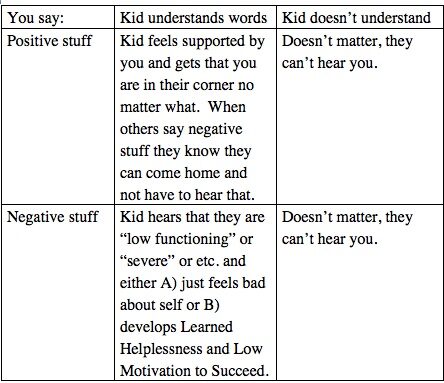Elizabeth J. Grace www.tinygracenotes.com There are zero-sum games in which there’s a winner and a loser because basically there’s only so much to go around, and there are non-zero-sum games which are not like that. In non-zero-sum games there are other outcomes, like everyone winning, because various real-life things can happen, like solidarity producing more goods to go around. A large-scale change in understanding of these things would have an immediate impact and far-reaching implications, especially concerning Autistics and parents of kids who are Autistic or have autism, whether the parents are on the spectrum or Autistic or not. In game theory studies such as the famous Prisoner’s Dilemma (which has actually gone through a lot of empirical runs with live participants) it has been shown that people are willing to act against their best interest in the whole story in order to make sure their “opponent” cannot possibly “do…
Tag: Ibby Grace
Elizabeth J. Grace www.tinygracenotes.com You can read in Loud Hands: Autistic People, Speaking about the shall-remain-nameless professor who said in front of me and many others in graduate school that autistics did not know what it was like to be themselves because they had no theory of mind, so one had to read research about them done by others in order to understand them at all, (which presumably if you were one of them, you never would anyway — this part is logically editorialized by me). There was another professor who said in a large class of aspiring special education and psychology researchers, “Except for Grace, the idiot savant, who doesn’t count,” because I recalled more than seven allegedly random numbers which were not actually random, but had a clear pattern, and he hadn’t told me ahead of time that the object of the exercise was to demonstrate that nobody…
Elizabeth J. Grace www.tinygracenotes.com Layenie, my wife, is a pediatric nurse. I feel very comfortable asking her questions about the health and development of our young sons. They will turn one in January and are ahhh they are soooo adorable … but I digress. I might be digressing because the beginning of this post hurts a little to write. The other evening, I had been staying home with the boys, which I do once a week, because, you know, child care costs a lot, and also, as I wrote, adorable. Benjy was doing this thing with his hand which is very like something I also do with my own hand, so this is what I said — and although I am not usually able to hear myself, I can derive a proper quote from the ensuing conversation: Ib: “See what Benjy’s doing with his hand there … is that OK?”…
Self-Advocate Elizabeth (Ibby) Grace’s blog Tiny Grace Notes is subtitled “Ask an Autistic,” and that is exactly what people do — solicit Autistic insights from her. We asked if we could republish a recent conversation Ibby had with Tina, an autism parent — to show that these conversations do happen, that they can be fruitful, and in the hopes that more such exchanges will happen. This is part 2 of 2. We recommend reading Part 1 first, for context. —- Tina writes: I’ll try to answer your questions. I’m glad you asked all these questions. I dont know how many I can answer but am trying to answer them. J likes pizza, it’s the only thing he’ll eat. He strips the cheese off, eats that first then licks the tomato sauce off then scrapes the soft doughy part with his teeth and leaves the outer crust and what’s left of…
Self-Advocate Elizabeth (Ibby) Grace’s blog Tiny Grace Notes is subtitled “Ask an Autistic,” and that is exactly what people do — solicit Autistic insights from her. We asked if we could republish a recent conversation Ibby had with Tina, an autism parent — to show that these conversations do happen, that they can be fruitful, and in the hopes that more such exchanges will happen. This is part 1 of 2. —- Tina: I have a question. I have a severely disabled son. He is nonverbal, is still in diapers, has self harming behaviors, hits himself in the face repeatedly and eats with his hands. I doubt he will ever progress to the point of living independently. I just can’t imagine that ever happening as he’s already 12 years old and only in the last year has he indicated that he understands what I mean when I ask him if…
Elizabeth J. Grace www.tinygracenotes.com I haven’t seen my friend Eric in years, and we are not in touch right now because our friendship, our communion, is about hanging out together. He’s not much of a talker at all, maybe ten words? and not a writer. (And even if he were a talker, I am heinous on the phone.) Next time I am in his town, and we see each other, it will still be easy to hang out with each other as if we just left off, because we both love to sit in our sea cliff hangout hidden by sea grass and watch the ocean. We like to do this quietly. Eric is on the ball and understands what people are saying and doing. I and some others find this obvious, but not everybody does. For one thing, he knows your name if he likes you, and if he…
…One Unicorn at a Time. Carol Greenburg aspieadvocate-ascd.blogspot.com We Unicorns seldom have a chance to gather in the magical wild lands of Manhattan, but thanks to a press pass arranged by Sharon daVanport, president of Autism Women’s Network, I got to meet another of my species at a panel entitled Autistic and Female: They say That’s Rare and so Many Other Things at the Disability Studies in Education conference at Hunter College, on May 27: Dr. Elizabeth “Ibby” Grace. With a generous dollop of the whimsy autistic people are alleged to lack, Dr. Grace, an assistant Professor with the Diversity in Learning and Teaching Department and research methodologist at Louis University in Chicago, used her unicorn analogy to expose the myth behind the assumption that females with autism are rare. In fact, Dr. Grace maintains, autistic girls and women like her, and like me, are everywhere, but vastly under-identified and…

